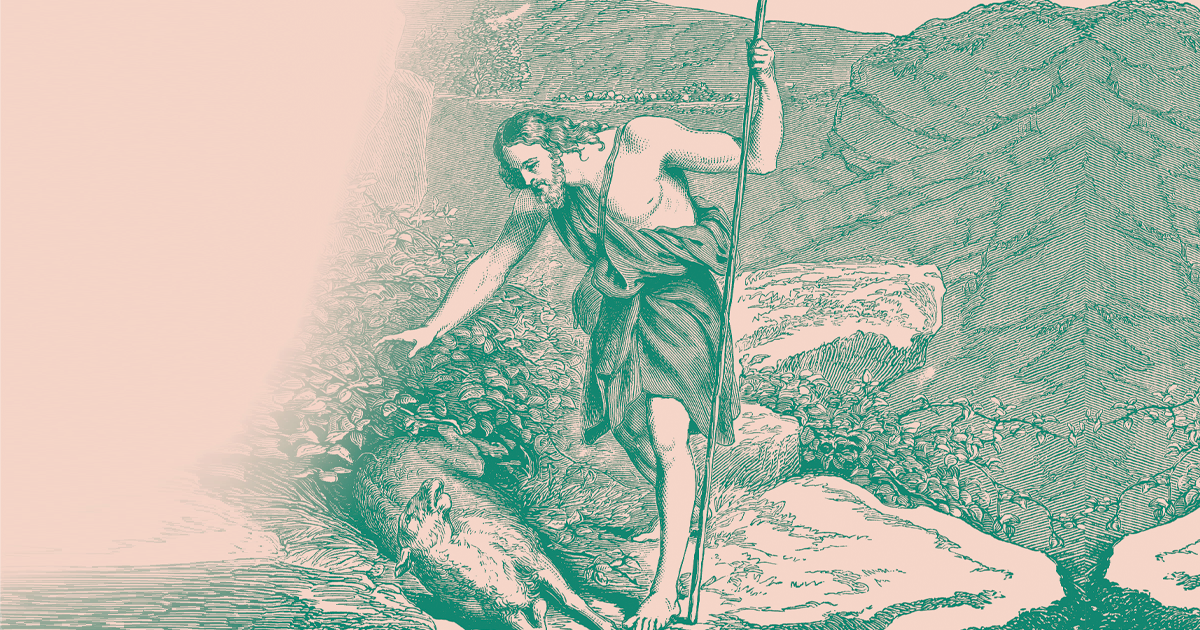6. The Shepherd as Physician
"Be grateful that we have a righteous Shepherd who has healing in His wings."
In the ancient world, shepherds were on their own. They had to act as field medics when any of their sheep needed first aid for injury or disease. A minor injury would have quickly become serious or even fatal if not treated properly. Experts note that “The ancient Jews and Egyptians knew many forms of animal diseases. Moses established a system of meat inspection which is still practiced by the Jewish people in our modern packing houses.”
David’s vocation as a shepherd, as well as his close relationship with the divine Shepherd, made him keenly aware of God’s desire to heal. David himself cried out for healing (Psalm 30:2), and looked to the Lord’s healing as a remedy for his past sins (Psalm 41:4). His psalms point the brokenhearted to the Lord for healing and restoration (Psalm 147:3). And in Psalm 23, he proclaims that God the Shepherd provides for the needs of His sheep and renews their strength.
As we prepare to celebrate the birth of Christ, one of the songs of the season, “Hark! The Herald Angels Sing,” affirms the healing nature of the coming Savior. The words in the third verse of are borrowed from the Book of Malachi in the Old Testament.
Hail! the heaven-born Prince of Peace!
Hail! the Son of Righteousness!
Light and life to all He brings,
Risen with healing in His wings
Mild He lays His glory by,
Born that man no more may die:
Born to raise the son of earth,
Born to give them second birth.
Hark! the herald angels sing,
“Glory to the new-born King!”
The writer of this beautiful carol quotes from the Old Testament’s Book of Malachi: “But for you who fear My name, the sun of righteousness shall rise with healing in its wings. You shall go out leaping like calves from the stall” (4:2). The lyricists see Malachi’s words as pointing to the coming of Jesus, emphasized by changing “sun of righteousness” to “Son of Righteousness.” Alfred Edersheim, an Old Testament theologian, notes that the healing nature of the Lord weaves its way through the creation from the beginning of time through its culmination. “Meanwhile, this grand primeval promise, ‘The seed of the woman shall bruise the head of the serpent…’ first in the promise to Shem, next in that to Abraham, then in the prophecy of Jacob, and so on through the types of the Law to the promises of the Prophets, till in the fullness of time ‘the Sun of Righteousness’ arose ‘with healing under His wings.’”
The Prophet Ezekiel also helps us to see the healing nature of the shepherd. He begins by leveling a charge against the “shepherds” of Israel who have failed in their task as the healers of God’s people. “The weak you have not strengthened, the sick you have not healed, the injured you have not bound up…[and] you have not sought the lost” (34:4, ESV). He then contrasts the poor performance of Israel’s shepherds (leaders) with the leadership of David, an archetype of the ideal shepherd. Ezekiel prophesies that the Lord will set up David, his servant, as shepherd. David had been dead for some 400 years when this book was written.
Ezekiel was either predicting the resurrection of David or more likely pointing toward the Messiah, the Good Shepherd (vs. 23-24). Ezekiel points to four things the Lord will accomplish: strengthening the weak, healing the sick, binding up injuries, seeking the lost. This would have been a welcome message for Israelites, who were displaced and living in exile in Babylon. “I will seek the lost, and I will bring back the strayed, and I will bind up the injured, and I will strengthen the weak…” (34:16).
Reason to Rejoice
The concept of lost sheep is woven throughout scripture. Luke shows Jesus challenging a group of religious leaders known as the Pharisees by pointing out that their attitude regarding sinners was worlds apart from God’s compassion and love for the lost. As one commentator says, “they believed in separation from sinners because God obviously hated such people.” Jesus employs a trilogy of parables to bring home this point that God sees value in sinners (lost sheep) and that there is reason to rejoice when one of those sinners turns their heart to God.
Sheep are not known for their strength. However, when you combine the herd-nature of sheep with the watchfulness of a competent shepherd, what was weak becomes remarkably stronger. The threat of a predator killing an individual sheep diminishes when the sheep stay close together. The well-armed shepherd is the real strength of the herd.
The world is a dangerous place. Spend any amount of time in it and your spirit is certain to experience some damage. Our Shepherd has compassion on us. “He heals the brokenhearted and binds up their wounds” (Psalm 147:3 NIV).
We can be grateful that we have a righteous Shepherd who has healing in His wings. In Him we find healing and protection, which reaches even the deepest injuries that plague us. David affirms and invites us to recognize that the Lord is our Shepherd who is able and willing to heal our wounds and restore our souls.







